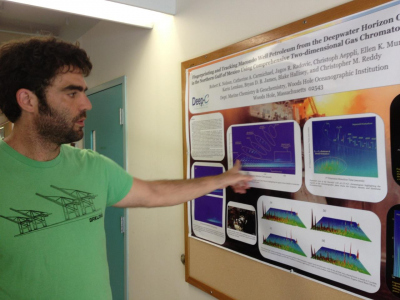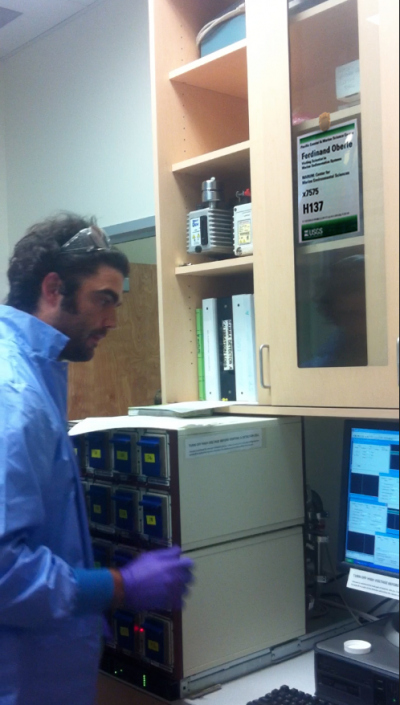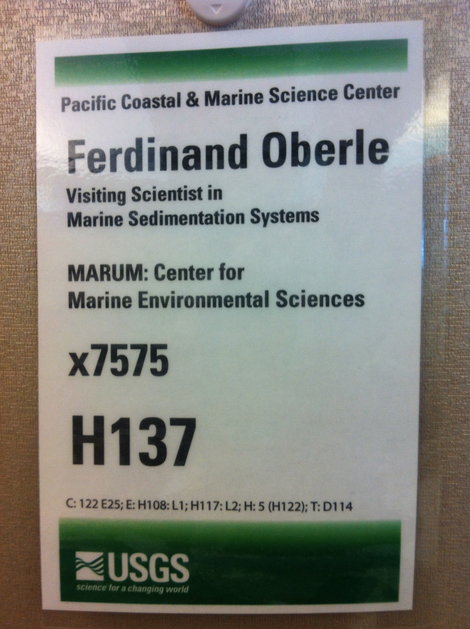Die Inhalte dieser Seite sind leider nicht auf Deutsch verfügbar.
Seitenpfad:
- Graduate School GLOMAR
- PhD student reports
- Research Placements
- Ferdinand Oberle
Ferdinand Oberle
Report of GLOMAR PhD student Ferdinand Oberle about his research stay at the United States Geological Survey, Santa Cruz, CA, USA from February - May 2013 and at the Woods Hole Oceanographic Institution, Woods Hole, MA, USA from May - July 2013
I would like to thank Glomar/MARUM for the financial support for my research stay at the United States Geological Survey (USGS) and the Woods Hole Oceanographic Institute (WHOI), USA.
The first part of my research stay (Feb.-May) was at the USGS - Pacific Coastal & Marine Science Center in Santa Cruz, California. I was offered the very rewarding opportunity to learn how to a) program a DELFT 3-D sediment-resuspension model; b) develop a 210Pb geochronology using both alpha and gamma ray spectrometry and c) process fishing-vessel monitoring data using various GIS-tools. The collegial communication between all levels of scientists at USGS was very encouraging and scientifically helpful and a much appreciated balance to the long hours in the laboratories. The educational aspect of my stay at the USGS was further broadened by weekly seminars on ongoing and cutting-edge research at the USGS. When I left Santa Cruz I was rewarded not only with having made serious strides towards a successful completion of my PhD but also with a number of great new friends and awe-inspiring scientists. I would like to thank Brian Edwards, Bob Rosenbauer, Peter Swarzenski and Curt Storlazzi for their facilitating help, their keen scientific advice and their profound input in my education.
The second leg of my research stay was carried out at the WHOI in the Lab of Dr. Christopher Reddy (May-July). Working under the thought-provoking guidance of Dr. Christopher Reddy and Robert Nelson, I learned how to process sediment samples for petroleum hydrocarbon biomarkers analysis using multiple gas chromatography methods. As a part of the Reddy Lab I was given the opportunity to become involved in the ongoing research of the Deep Water Horizon Accident in the Gulf of Mexico that culminated in an educationally significant sampling trip to the Gulf of Mexico. Being part of the vibrant and very inclusive WHOI community also allowed me to discuss my findings with leading scientists on a daily basis and attend multiple seminars. I cannot thank the friendly scientists at the WHOI enough for their scientific advice and input. Most significant are Christopher Reddy, Robert Nelson, Christopher Aeppli, Mike McNulty and Catherine Carmichael.
While data processing is still ongoing and many aspects of my research still remain to be unfolded, I can already tell that the outcome of this experience has proven, and will prove pivotal to the successful progress of my PhD education. In summary, I feel very fortunate to have been given the opportunity to partake in this research stay. It expanded my knowledge base significantly, gave me the unique opportunity to create an important data set, and establish contacts not only valuable to the outcome of my PhD but probably to my scientific career in general.
The first part of my research stay (Feb.-May) was at the USGS - Pacific Coastal & Marine Science Center in Santa Cruz, California. I was offered the very rewarding opportunity to learn how to a) program a DELFT 3-D sediment-resuspension model; b) develop a 210Pb geochronology using both alpha and gamma ray spectrometry and c) process fishing-vessel monitoring data using various GIS-tools. The collegial communication between all levels of scientists at USGS was very encouraging and scientifically helpful and a much appreciated balance to the long hours in the laboratories. The educational aspect of my stay at the USGS was further broadened by weekly seminars on ongoing and cutting-edge research at the USGS. When I left Santa Cruz I was rewarded not only with having made serious strides towards a successful completion of my PhD but also with a number of great new friends and awe-inspiring scientists. I would like to thank Brian Edwards, Bob Rosenbauer, Peter Swarzenski and Curt Storlazzi for their facilitating help, their keen scientific advice and their profound input in my education.
The second leg of my research stay was carried out at the WHOI in the Lab of Dr. Christopher Reddy (May-July). Working under the thought-provoking guidance of Dr. Christopher Reddy and Robert Nelson, I learned how to process sediment samples for petroleum hydrocarbon biomarkers analysis using multiple gas chromatography methods. As a part of the Reddy Lab I was given the opportunity to become involved in the ongoing research of the Deep Water Horizon Accident in the Gulf of Mexico that culminated in an educationally significant sampling trip to the Gulf of Mexico. Being part of the vibrant and very inclusive WHOI community also allowed me to discuss my findings with leading scientists on a daily basis and attend multiple seminars. I cannot thank the friendly scientists at the WHOI enough for their scientific advice and input. Most significant are Christopher Reddy, Robert Nelson, Christopher Aeppli, Mike McNulty and Catherine Carmichael.
While data processing is still ongoing and many aspects of my research still remain to be unfolded, I can already tell that the outcome of this experience has proven, and will prove pivotal to the successful progress of my PhD education. In summary, I feel very fortunate to have been given the opportunity to partake in this research stay. It expanded my knowledge base significantly, gave me the unique opportunity to create an important data set, and establish contacts not only valuable to the outcome of my PhD but probably to my scientific career in general.
Poster on a two-dimensional gas chromatography method in Fye Laboratory of the Woods Hole Oceanographic Institute, Massachusetts. (July, 2013)





